我的初步计划将完成音乐播放器的开发,所有代码均会在仓库中更新。
一、FatFs
官网
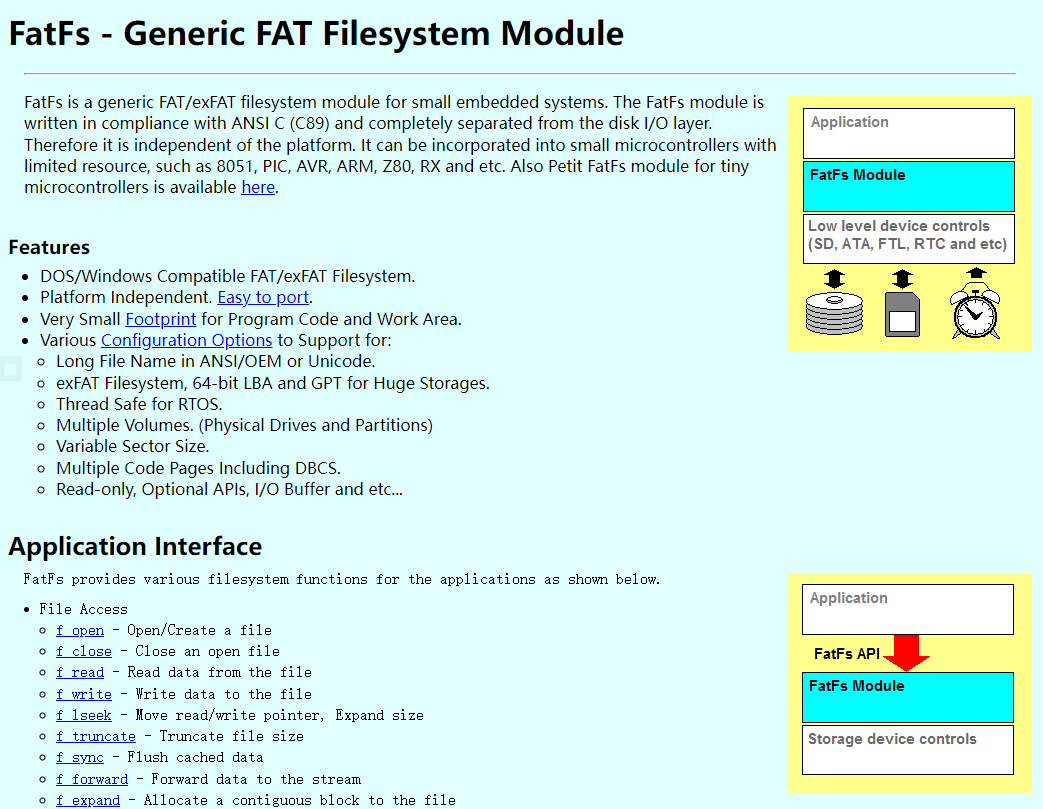
我们先下载源码包,或者在MindSDK中也有。
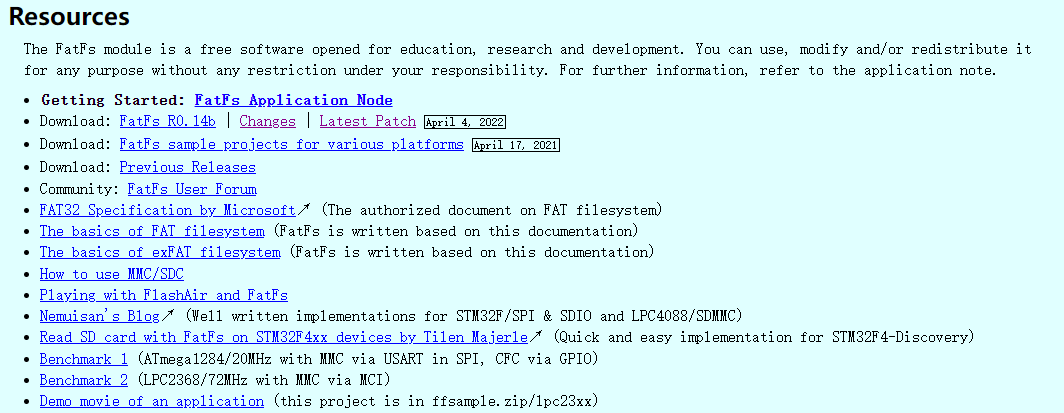
FatFs是用于小型嵌入式系统的通用FAT / exFAT文件系统模块。FatFs模块是按照ANSI C(C89)编写的,并且与磁盘I/O层完全分开。因此,它独立于平台。它可以并入资源有限的小型微控制器中,例如8051,PIC,AVR,ARM,Z80,RX等。
“FatFs模块是为教育,研究和开发开放的免费软件。您可以在个人项目或商业产品中使用,修改和/或重新分发它,而不受您的责任限制。”
特征
- DOS / Windows兼容的FAT / exFAT文件系统。
- 平台无关。易于移植。
- 程序代码和工作区的占用空间非常小。
- 支持以下各种配置选项:
- ANSI / OEM或Unicode中的长文件名。
- exFAT文件系统,64位LBA和GPT可存储大量数据。
- RTOS的线程安全。
- 多个卷(物理驱动器和分区,最多10个卷)。
- 可变扇区大小。
- 多个代码页,包括DBCS。
- 只读,可选API,I / O缓冲区等…
层级结构
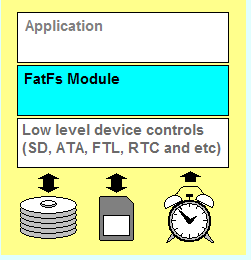
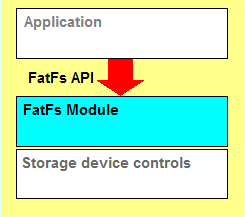
文件夹

documents文件夹中就是官方的文档文件
source文件中就是我们的源文件
还有证书文件
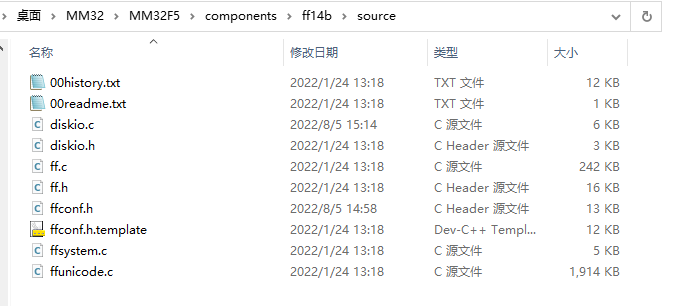
- 00history.txt 介绍了 FatFs 的版本更新情况。
- 00readme.txt 说明了当前目录下 diskio.c 、 diskio.h、 ff.c、 ff.h、 integer.h 的功能。
- diskio.c 文件是 FatFs 移植最关键的文件,它为文件系统提供了最底层的访问 SPI Flash芯片的方法, FatFs 有且仅有它需要用到与 SPI Flash 芯片相关的函数。
- diskio.h 定义了FatFs 用到的宏,以及 diskio.c 文件内与底层硬件接口相关的函数声明。
源码文件功能简介如下:
- diskio.c:包含底层存储介质的操作函数,这些函数需要用户自己实现,主要添加底层驱动函数。
- ff.c:FatFs 核心文件,文件管理的实现方法。该文件独立于底层介质操作文件的函数,利用这些函数实现文件的读写。
二、MindSDK——SD_SPI
我们打开MindSDK的官网,没有账户的需要注册一下。
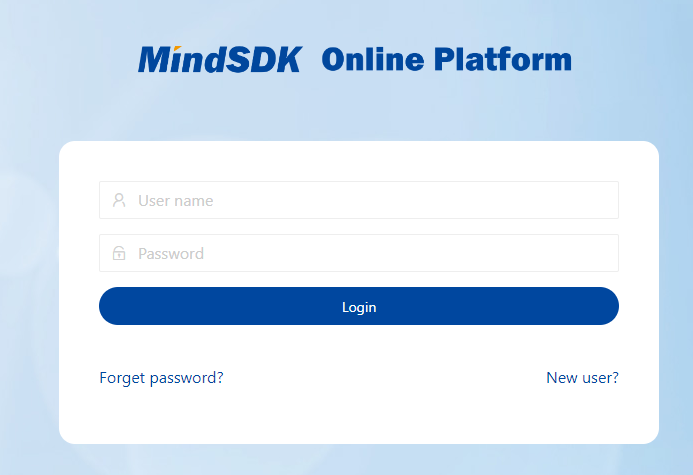
我们构建F5270,系统我的是Win10,编译器是keil,这是我的选择,大家可以根据自己的来选择。
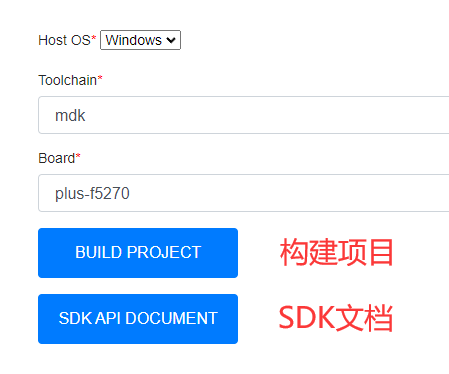
构建完成后,我们来到以下页面,点击进入

我们选择进入例程文件中
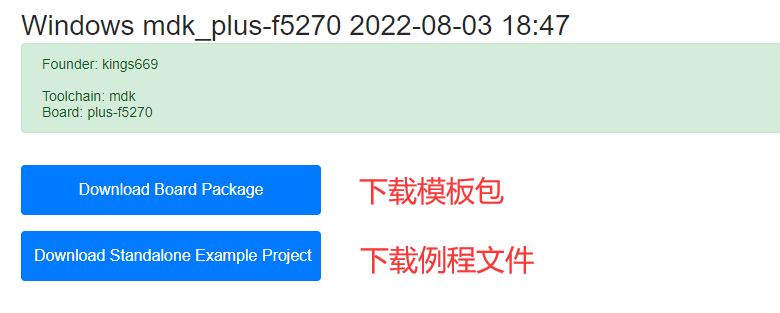
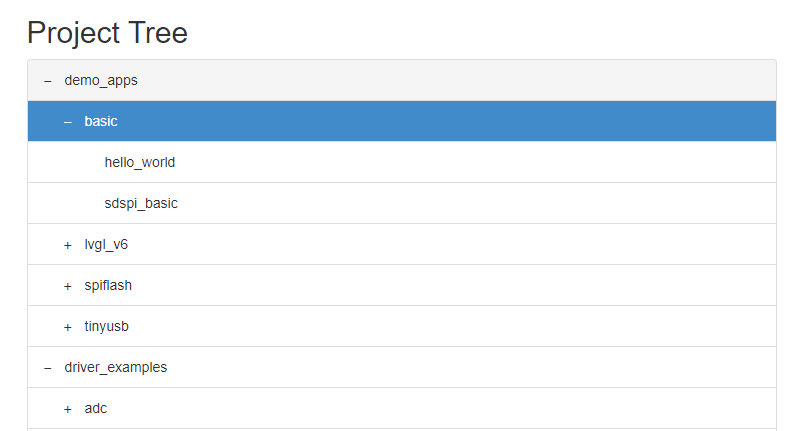
我们选中sdspi_basic,然后点击下载。

我们编译一下,很好没有问题:

三、移植FatFS
我们把FatFS源代码放在components文件夹中。

我们需要修改diskio.c文件中的东西。
/ ----------------------------------------------------------------------- /
/* Low level disk I/O module SKELETON for FatFs (C)ChaN, 2019 */
/* -----------------------------------------------------------------------*/
/* If a working storage control module is available, it should be */
/* attached to the FatFs via a glue function rather than modifying it. */
/* This is an example of glue functions to attach various exsisting */
/* storage control modules to the FatFs module with a defined API. */
/* -----------------------------------------------------------------------*/
#include "ff.h" /* Obtains integer types */
#include "diskio.h" /* Declarations of disk functions */
#include "sdspi.h"
/* Definitions of physical drive number for each drive */
#define DEV_RAM 0 /* Example: Map Ramdisk to physical drive 0 */
#define DEV_MMC 1 /* Example: Map MMC/SD card to physical drive 1 */
#define DEV_USB 2 /* Example: Map USB MSD to physical drive 2 */
SDSPI_ApiRetStatus_Type app_sdspi_ret;
SDSPI_CardHandler_Type app_sdspi_card;
extern const SDSPI_Interface_Type board_sdspi_if;
/ ----------------------------------------------------------------------- /
/* Get Drive Status */
/* -----------------------------------------------------------------------*/
DSTATUS disk_status (
BYTE pdrv /* Physical drive nmuber to identify the drive */
)
{
DSTATUS stat;
int result;
switch (pdrv) {
case DEV_RAM :
//result = RAM_disk_status();
return stat;
case DEV_MMC :
//result = MMC_disk_status();
stat = RES_OK;
// translate the reslut code here
return stat;
case DEV_USB :
//result = USB_disk_status();
return stat;
}
return STA_NOINIT;
}
/ ----------------------------------------------------------------------- /
/* Inidialize a Drive */
/* -----------------------------------------------------------------------*/
DSTATUS disk_initialize (
BYTE pdrv /* Physical drive nmuber to identify the drive */
)
{
DSTATUS stat;
//int result;
switch (pdrv) {
case DEV_RAM :
//result = RAM_disk_initialize();
// translate the reslut code here
return stat;
case DEV_MMC :
//result = MMC_disk_initialize();
if(!SDSPI_Init(&app_sdspi_card, &board_sdspi_if)){
stat = RES_OK;
}else{
stat = STA_NOINIT;
}
// translate the reslut code here
return stat;
case DEV_USB :
//result = USB_disk_initialize();
// translate the reslut code here
return stat;
}
return STA_NOINIT;
}
/ ----------------------------------------------------------------------- /
/* Read Sector(s) */
/* -----------------------------------------------------------------------*/
DRESULT disk_read (
BYTE pdrv, /* Physical drive nmuber to identify the drive */
BYTE buff, / Data buffer to store read data */
LBA_t sector, /* Start sector in LBA */
UINT count /* Number of sectors to read */
)
{
DRESULT res;
//int result;
switch (pdrv) {
case DEV_RAM :
// translate the arguments here
//result = RAM_disk_read(buff, sector, count);
// translate the reslut code here
return res;
case DEV_MMC :
// translate the arguments here
if(!SDSPI_ReadBlocks(&app_sdspi_card,buff, sector, count))
{
res = RES_OK;
}else{
res = RES_ERROR;
}
return res;
case DEV_USB :
// translate the arguments here
return res;
}
return RES_PARERR;
}
/ ----------------------------------------------------------------------- /
/* Write Sector(s) */
/* -----------------------------------------------------------------------*/
#if FF_FS_READONLY == 0
DRESULT disk_write (
BYTE pdrv, /* Physical drive nmuber to identify the drive */
const BYTE buff, / Data to be written */
LBA_t sector, /* Start sector in LBA */
UINT count /* Number of sectors to write */
)
{
DRESULT res;
//int result;
switch (pdrv) {
case DEV_RAM :
return res;
case DEV_MMC :
if(!SDSPI_WriteBlocks(&app_sdspi_card,(uint8_t *)buff, sector, count))
{
res = RES_OK;
}else{
res = RES_ERROR;
}
return res;
case DEV_USB :
return res;
}
return RES_PARERR;
}
#endif
/ ----------------------------------------------------------------------- /
/* Miscellaneous Functions */
/* -----------------------------------------------------------------------*/
DRESULT disk_ioctl (
BYTE pdrv, /* Physical drive nmuber (0..) */
BYTE cmd, /* Control code */
void buff / Buffer to send/receive control data */
)
{
DRESULT res;
int result;
switch (pdrv) {
case DEV_RAM :
return res;
case DEV_MMC :
switch(cmd)
{
case GET_SECTOR_COUNT:
*(DWORD *)buff = app_sdspi_card.blockCount;
res = RES_OK;
break;
case GET_BLOCK_SIZE:
*(DWORD *)buff = SDSPI_DEFAULT_BLOCK_SIZE;
res = RES_OK;
break;
}
return res;
case DEV_USB :
return res;
}
return RES_PARERR;
}
mian.c:
#include "board_init.h"
#include "ffconf.h"
#include "ff.h"
FATFS fs;
const TCHAR fs_drv[] = "1:/";
TCHAR fs_path[256] = "\0";
FRESULT app_fatfs_listfiles(const char * dir_path);
int main(void)
{
uint8_t ch;
BOARD_Init();
printf("sdspi_basic example.\r\n");
printf("f_mount(). ");
if( !f_mount(&fs, fs_drv ,1) )
{
printf("succ.\r\n");
}
else
{
printf("fail.\r\n");
while (1)
{}
}
app_fatfs_listfiles(fs_drv);
fs_path[0] = '\0';
strcat(fs_path, fs_drv);
strcat(fs_path, "dir0/");
app_fatfs_listfiles(fs_path);
fs_path[0] = '\0';
strcat(fs_path, fs_drv);
strcat(fs_path, "dir1/");
app_fatfs_listfiles(fs_path);
printf("app_fatfs_listfiles() done.\r\n");
while (1)
{
ch = getchar();
putchar(ch);
}
}
FRESULT app_fatfs_listfiles(const char * dir_path)
{
FRESULT res;
FILINFO fno;
DIR dir;
char *fn;
printf("* %s ->\r\n", dir_path);
res = f_opendir(&dir, dir_path);
if (res != FR_OK)
{
return res;
}
for (;;)
{
res = f_readdir(&dir, &fno);
if ( (res != FR_OK) || (fno.fname[0] == 0) )
{
break;
}
if (fno.fname[0] == '.')
{
continue;
}
fn = fno.fname;
if (fno.fattrib & AM_DIR)
{
printf("\t%s/\r\n", fn);
}
else
{
printf("\t%s: %u B\r\n", fn, (unsigned)fno.fsize);
}
}
res = f_closedir(&dir);
return res;
}
四、验证
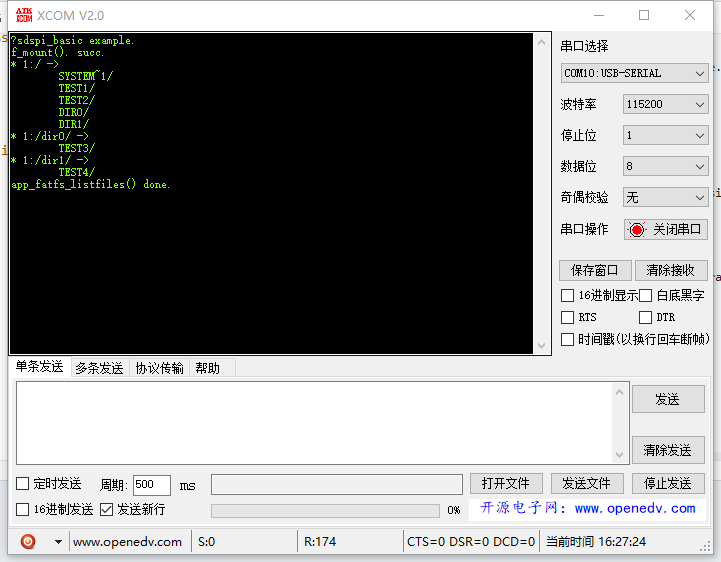
我们插上读卡器:

在dir0和dir1中也有两个文件夹,是Test3和Test4.这些文件夹都是我自己创建的,MCU已经能够查看到了。没有问题
五、总结
MindSDK使用体验还行,只能提供例子。最好能够有CubeMX这样的配置,添加包就行,就会方便很多。现在移植好了文件系统,下一步就是要进行软解码了。
原作者:kings669669
 /9
/9 